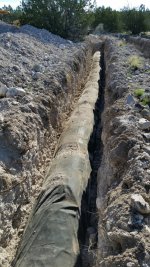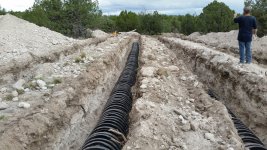buickanddeere
Super Member
Ever since “Walkerton Water” the opportunists in politics, engineering and legal have not missed any opportunities to increase their powers and fees .
Our municipality was having the same problem. Finally we elected some counselors in that could think. Now you can use someone else's engineering if the soil types are similar. That reduced costs by about half.
Wasn't Walkerton on the supply side rather than the effluent side.
Your comments really crack me up.
Walkerton had effluent flowing into the supply side .
Poor treatment of the incoming well water which led to an E. Coli outbreak:Was that effluent from the towns treatment plant??
Or did they have problems treating the incoming well water?
https://en.m.wikipedia.org/wiki/Walkerton_E._coli_outbreak said:At the time of the event in May 2000, Stan Koebel was utilities manager for Walkerton, and his brother Frank Koebel was water foreman. Neither had any formal training in this position, retaining their jobs through three decades of on-the-job experience. The water supply, drawn from groundwater, became contaminated with the highly dangerous O157:H7 strain of E. coli bacteria. This contamination was due to farm runoff into an adjacent water well that had been known for years to be vulnerable to groundwater contamination.
Starting May 13, 2000, many people of the community of about 5,000 people began to experience bloody diarrhea, gastrointestinal infections and other symptoms of E. coli infection. For days the Walkerton Public Utilities Commission insisted the water supply was "OK" despite being in possession of laboratory tests that had found evidence of contamination. On 21 May, an escalation in the number of patients with similar symptoms finally spurred the region's Medical Officer of Health, Murray McQuigge, to issue a boil-water advisory, warning residents not to drink the tapwater.
The five people who died directly from drinking the E. coli-contaminated water might have been saved if the Walkerton Public Utilities Commission had admitted to contaminated water sooner, and about 2,500 became ill. An experimental drug in Phase III clinical trials, Synsorb Pk, was used to treat 19 children on compassionate grounds under Health Canada's Special Access Program.
During the time of the tragedy, both Stan and Frank Koebel denied any wrongdoing and firmly held that the water at Walkerton was safe to drink. However, as the tragedy grew in severity the two were eventually part of the criminal investigation into the tragedy, and, as a result, both would eventually plead guilty to a charge of common nuisance through a plea bargain. In their plea, they admitted to falsifying reports and Frank admitted to drinking on the job, as a beer fridge did exist at the facility.
They were both formally sentenced on December 21, 2004, with Stan receiving one year in jail and Frank Koebel nine months of house arrest. Reaction to their sentencing was mixed.
No provincial government politician was charged or found guilty of wrongdoing. As law professor Bruce Pardy notes, "Policy development is not subject to tort liability."

